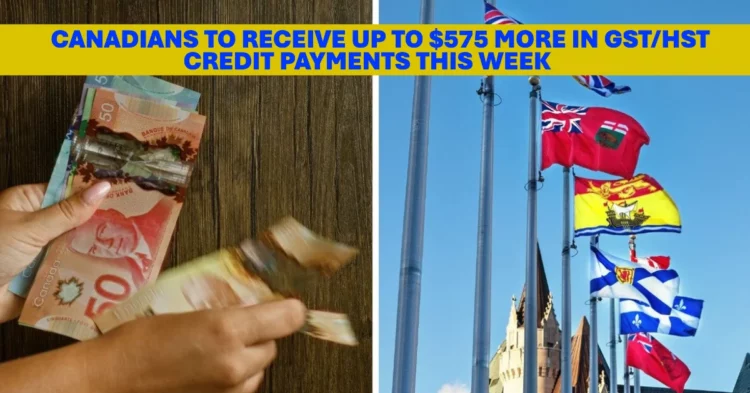Starting July 2025, millions of Canadians will receive an increased GST/HST Credit payment — and if you live in certain provinces, you could pocket hundreds more per quarter than just the federal base amount.
Here’s a province-by-province breakdown of what’s changing, who’s eligible, and how much more money could be coming your way this year.
Table of Contents
What Is the GST/HST Credit?
The GST/HST Credit is a tax-free payment issued every quarter by the Canada Revenue Agency (CRA). It helps lower- and modest-income Canadians offset the Goods and Services Tax (GST) or Harmonized Sales Tax (HST) they pay on everyday purchases.
In July 2025 — the start of the new benefit year — the federal amounts are increasing to:
- $133.25 for a single person
- Up to $266.50 for a family of four
Some provinces sweeten the pot with their own top-up programs, automatically bundled into your regular GST/HST Credit payment. Depending on where you live, you could see up to $575.50 extra every quarter.
Who Doesn’t Get a Provincial Top-Up in 2025?
While most Atlantic and Prairie provinces offer generous top-ups, residents in Alberta, Manitoba, Ontario, Quebec, and B.C. (along with the territories) will only receive the federal portion of the GST/HST Credit this year.
That’s because:
- Some provinces offer separate benefit programs (e.g., Ontario Trillium Benefit).
- Others used to provide carbon tax rebates — which have now been eliminated.
Still, if you missed out on a previous year’s carbon rebate in B.C., Yukon, or the territories, retroactive payments may still be available.
Provincial GST/HST Credit Top-Ups for 2025
Let’s explore how much extra you could get, province by province.
New Brunswick: Harmonized Sales Tax Credit (NBHSTC)
If you live in New Brunswick, you could receive up to $200 extra per quarter:
- $75 for a single person
- $75 for a spouse or first child in a single-parent home
- $25 per additional child under 19
Eligibility starts phasing out when your adjusted family net income exceeds $35,000.
No application is needed — just file your taxes.
Canada GST/HST Credit June 2025 Update: Here’s When the Next GST/HST Credit is Coming
Fact Check: $3000 GST Payment 2025 – Is it Real or Rumour
GST/HST Payment Increase July 2025: What Canadians Need to Know
New $680 GST/HST Amount Coming in 2025: Payment Dates, and Eligibility Explained
Newfoundland & Labrador: Up to $575.50 in Quarterly Credits
Newfoundland and Labrador offer three separate top-ups:
1. NL Income Supplement (NLIS)
- $130 per individual
- $17.25 for a spouse or partner
- $57.75 per child
- Max: $262.75 per quarter for a family of four
2. NL Disability Amount (NLDA)
- $57.75 per quarter per eligible adult (DTC recipients)
3. NL Seniors’ Benefit (NLSB)
- Up to $387.75 per quarter for seniors earning less than $30,078
- Partial amounts available up to an income of $43,380
Total Potential Top-Up: $575.50 per individual per quarter
Use the province’s online calculator to estimate your payment.
Nova Scotia: Affordable Living Tax Credit (NSALTC)
- $63.75 per individual or couple
- $15 per child
- Family of four: up to $93.75 per quarter
Payments begin to decrease once your family net income exceeds $30,000.
Prince Edward Island: P.E.I. Sales Tax Credit
- $27.50 per individual
- $13.75 for spouse or eligible dependant
- Additional $13.75 if family income exceeds $30,000
- Max: $55 per quarter
This credit phases out after a family income of $50,000.
Saskatchewan: Low-Income Tax Credit (SLITC)
Saskatchewan offers one of the most generous provincial top-ups:
- $107.25 per individual
- $107.25 for a spouse or dependant
- $42.25 per child (up to 2 children)
- Max for a family of four: $299 per quarter
Benefits begin phasing out when net income exceeds $38,588, with partial benefits up to $80,058.
BC & the Territories: Carbon Rebates Gone, But Retroactive Payments Possible
With the end of the federal consumer carbon tax in April 2025, provincial/territorial carbon rebates have also been discontinued in:
- British Columbia
- Yukon
- Northwest Territories
- Nunavut
But you might still receive a retroactive payment if you missed one in a previous year:
Past Carbon Rebate Highlights:
- B.C.: Up to $252 per quarter for a family of four
- Yukon: Up to $372 per quarter for rural families
- NWT: Up to $502 per quarter (zone-based)
- Nunavut: $25 per household member — up to $100 per quarter for a family of four
Still eligible? Make sure your taxes are filed to receive any retroactive top-ups automatically.
No Provincial Top-Ups for Alberta, Manitoba, Ontario & Quebec
If you’re in these provinces, your GST/HST Credit payment for 2025 will include only the federal portion. While these provinces offer separate benefit programs, they’re not tied to the CRA’s GST/HST Credit system.
For Example:
- Ontario: Offers the Ontario Trillium Benefit (administered separately)
- Quebec & Alberta: Deliver their own credits outside of CRA payments
How to Receive the Credit
No matter where you live, the most important thing to do is file your taxes on time each year — even if you have no income. The CRA uses your return to assess your eligibility and automatically issues payments.
Final Word: Don’t Miss Out on Free Money
With increased federal payments and generous provincial top-ups in some regions, the 2025 GST/HST Credit cycle is delivering more support than ever to eligible Canadians.
If you’re in one of the provinces offering a quarterly top-up, your July payment could be worth two to four times the federal base amount.
To make sure you get everything you’re entitled to:
- File your taxes annually
- Update your information with the CRA
- Use provincial calculators when available to estimate your payment
You don’t need to apply separately — but staying informed can help ensure you never leave money on the table.

